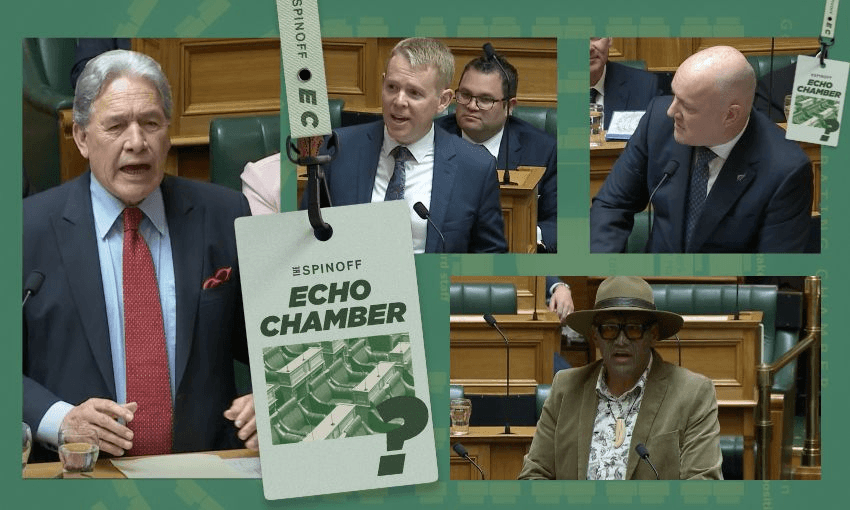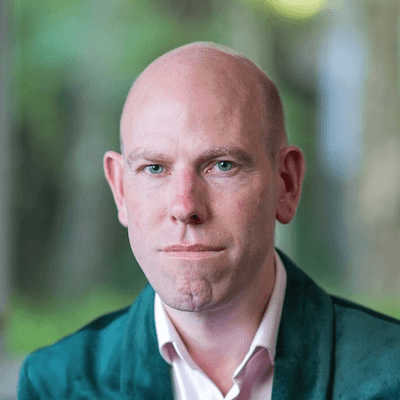The second sitting day of the year was summed up perfectly by speaker Gerry Brownlee: ‘I’m hearing far too much.’
Echo Chamber is The Spinoff’s dispatch from the press gallery, recapping sessions in the House. Columns are written by politics reporter Lyric Waiwiri-Smith and Wellington editor Joel MacManus. Read yesterday’s Echo Chamber here.
On the right, a coalition of yellow, pink, blue, black and white, defending champions. On the left, green, red, and slightly different shades of black and white, hoping for a comeback. The aim of the game: to retain enough public respect that someone might want to vote for you next year. The prize: power over the land.
“What are her priorities for the economic growth portfolio?” was the first question asked in the House, by Upper Harbour MP Cameron Brewer of National to finance minister Nicola Willis. It was a patsy question, one of those pātai the government asks itself during question time – “what are the outcomes since XYZ?”, “how well are you performing?” – to allow themselves some time to boast about the effects they’ve seen (or at least heard about) on the ground, the progress made, the lives changed by the policy they’ve enacted. And then there are the supplementary questions, like “why is economic growth important?”, which give them extra time to pat themselves on the back.
It only took a few minutes for speaker Gerry Brownlee to tell off the hecklers on the opposition side, who couldn’t help themselves but call out the name of caucus reshuffle victim Melissa Lee – who was minister of economic development (from which Willis’s economic growth portfolio was born) only three weeks ago.
“This is not going to be a great way to start the year, because a couple of people could be on their way shortly,” Brownlee warned. His threat did little to scare anyone. When that minor kerfuffle was over, oral questions moved to the opposition – Labour leader Chris Hipkins, who asked the prime minister, “Does he stand by all his government’s statements and actions?”
There it is again: the go-to question, but this time for the opposition. The point of this seemingly pointless question is to keep the real agenda hidden from the minister it’s directed to (questions are lodged with the office of the clerk in the morning, so the minister in question gets a few hours to prepare an answer) and avoid having the question bumped off to a different minister. It was asked twice more, by the Greens’ co-leader Chlöe Swarbrick and Te Pāti Māori’s Debbie Ngarewa-Packer, and will likely be asked tomorrow, and the next sitting day, and the next sitting day, and probably every other sitting day after that. And each time, the prime minister will answer “yes”. Then, when they’ve got the “yes”, the opposition will quickly rise back to their feet to voice the real question they wanted to ask – the supplementary, which from Hipkins was: “When did Nicola Willis ask the Treasury to produce a list of public assets that could be privatised, and did the Cabinet agree to that course of action?”
Luxon had no idea. He also wasn’t so keen on the topic of privatisation dominating question time, but he had Winston Peters on side. “Now listen here, sunshine,” he said to Hipkins, with a pointed finger smoking like a gun. “This isn’t student politics,” referring to where Hipkins famously got his start. Brownlee demurred: “I’m hearing far too much.”
Peters was only getting started. Through a question to Luxon, he accused Te Pāti Māori’s Rawiri Waititi of being friends with the thieves targeted by police’s Operation Trolley in Rotorua, a gag that was met with Waititi showing off his best impersonation of the shrug emoji. Points of order raised by Ngarewa-Packer and Labour’s Kieran McAnulty against Peters’ comments didn’t get very far – Brownlee said he intended to strike Peters’ words from Hansard, so it was back to business.
Simeon Brown took oral questions in his new role as health minister for the first time. Unlike caucus colleague Tama Potaka behind him – a little meeker, more dependent on his notes – Brown is a natural orator. He projects his voice so well that he can drown out everyone coming after him. He slammed his fist on the table so many times without actually slamming his fist on the table that it wouldn’t be surprising if he was a secret world-champion shadow boxer. He didn’t let Labour MP Peeni Henare’s hits stick, and there went Peters again, joking about “restoring Henare’s health after his seat was stolen from him”. It earned groans from much of Labour, but Henare got a kick out of it – he’ll find out next week if there’s any basis to Peters’ claim.
Anyway, if the cross-House chemistry was lacking, the new seating arrangements in place for the government side following National’s caucus reshuffle on January 19 seemed to be working out nicely. Chris Bishop and Brown, now no longer separated by Shane Reti, kept chummy conversation through the whole affair, while Sam Uffindell now gets plenty of screen time, sitting right behind David Seymour. The Act Party leader’s new neighbour, Judith Collins, seemed unfazed by everything going on around her.
When all was said and done, the House emptied out through the hallway doors. The Greens’ Tamatha Paul went over to Judith Collins for a chinwag, and sat beside her to take in her notes – one generation of parliament in a Pinterest-approved sweater and skirt, the other in classic Nats blue uniform.





